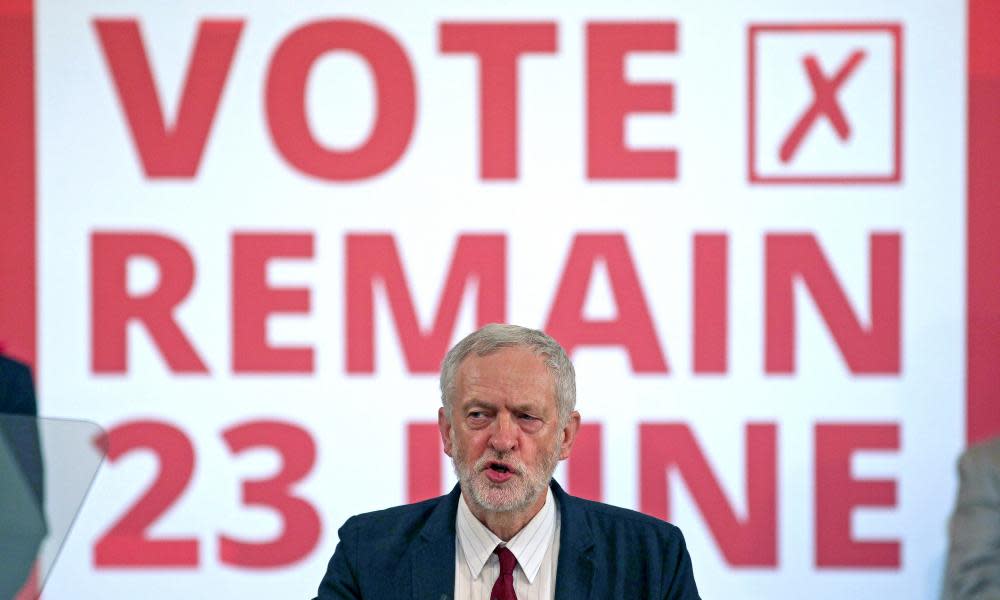Corbyn’s failed Brexit strategy sealed Labour’s fate

After leave-voting Labour seats turned blue – including my own – the party could put aside any postmortem and move straight into a beauty contest, as we did in 2015; or ignore it altogether, as we did in 2017. Or we could rush to pre-prepared excuses. For ardent remainers, it’s all Jeremy and the failed Corbyn project; for diehard Corbynistas, it’s Brexit, Tory lies and the nasty media. Both are in denial. In Don Valley, my constituency, on almost every other door it was either Jeremy, Brexit or both.
It’s not unusual in elections to hear voter dislike of our leader, but never on this scale. Voters made quite clear – sometimes brutally – what they thought of our candidate for prime minister.
Labour cannot be led by one of the architects of our failed Brexit strategy. Nor can our future leader be a Corbyn without the beard
Occasionally we met someone who loved Jeremy. But after thousands of conversations, my party workers and I found the hostility to Jeremy relentless. Too leftwing, unpatriotic, against the armed forces, poor on TV, unwilling to say sorry for antisemitism, his handling of Brexit … the list went on.
Without doubt, Corbyn has changed Labour. But is it an unstoppable mass movement? No. Jeremy promised “the biggest campaign this party has ever mounted”. It wasn’t. Apparently we beat the Tories on social media – but where their message was targeted at new voters, ours was an echo chamber of those already voting Labour.
In the relentless rain and dark nights, many candidates found volunteers thin on the ground. While visiting flood victims in Doncaster, Jeremy told me that “we had 500 people out in Chingford” – Iain Duncan Smith’s outer London seat. “You won’t find that here,” I replied. And we didn’t win Chingford either.
Labour wins when we have a leader the public believe in and a vision they can buy into. Some Labour policies were popular, but voters did not find them convincing. Free childcare, free tuition fees, free transport, free broadband – on top of free movement. One former GMB union shop steward and dinner lady commented, “Who’s paying for all this when I have worked all my life, and just about get by on my pension?”
The second front was Brexit. I had warned that if unresolved, it would be fatal. And it was Brexit that cemented Labour’s undoing – including in my own seat.
In March, I wrote: “Every Labour MP will face voters who ask: ‘Did you vote to back Brexit or did you vote to stop it?’” Voters did not like our answers. We lost 59 seats, mainly in leave areas. And it could have been so much worse. My neighbour Ed Miliband’s 14,000 majority in Doncaster became 2,370. Yvette Cooper’s majority of 14,499 in Normanton, Pontefract and Castleford was reduced to 1,276. Labour chair Ian Lavery’s 10,000 in Wansbeck is now just 814 votes.
Win or lose, I wouldn’t have changed my stance on Brexit. My constituents valued the fact that I was backing them on Brexit – but this was undermined by fear that a Labour government would block Brexit anyway. Better safe than sorry, they felt.
Brexit illustrated Jeremy’s weakness. The yo-yo policy, mixed messages, endless conditions – always failing to agree a Brexit deal, followed by support for a second referendum, in which he would be neutral. Now the Tories lay claim to be Britain’s party of the working class. We can face the hard truths or continue to delude ourselves. Labour has ignored working-class voters who chose leave.
Writing in yesterday’s Observer, Corbyn noted that in “travelling to all parts of our country … I’ve been continually struck by how far trust has broken down in politics.” Yet in London there is no reflection of the way that three years of procedural games and Brexit-blocking manoeuvres in parliament eroded that trust – antagonising Labour leave voters and driving them to the Tories, who promised to end the Brexit deadlock.
Related: Five reasons why Labour lost the election
In April, Labour’s frontbench had every prospect of securing many of Labour’s Brexit demands, ending the stalemate and, probably, stopping Boris Johnson becoming PM. They didn’t. They were willing to vote with the Tory hard right against the government, but not to vote with the government for a deal.
When Labour eventually moved all the way to a second-referendum policy, it went down like “a bucket of sick” back home, a Yorkshire colleague told me. It was another nail in northern Labour’s coffin, constructed in London. Remain voters helped Labour to hold Canterbury and gain Putney. But was it worth handing dozens of leave-voting Labour seats to the Tories?
Labour cannot be led by one of the architects of our failed Brexit strategy. Nor can our future leader be a Corbyn without the beard. The political culture Corbyn has encouraged is killing us – and the atmosphere he created has narrowed our coalition, betraying our history and achievements.
After Labour’s worst result since 1935, a majority of Labour MPs still represent leave-voting seats. Let’s not ignore these voters again.
• Caroline Flint was Labour MP for Don Valley from 1997 to 2019

 Yahoo News
Yahoo News 
